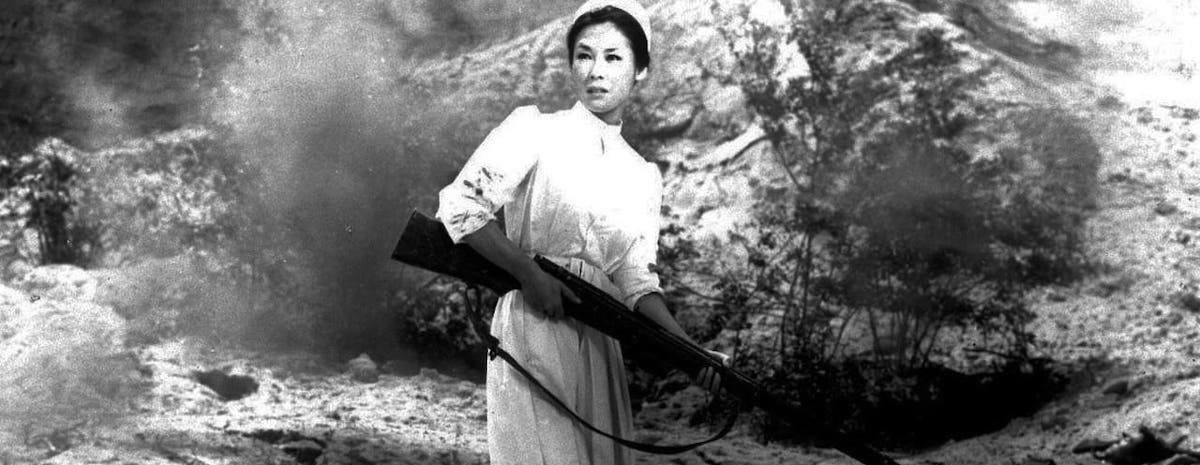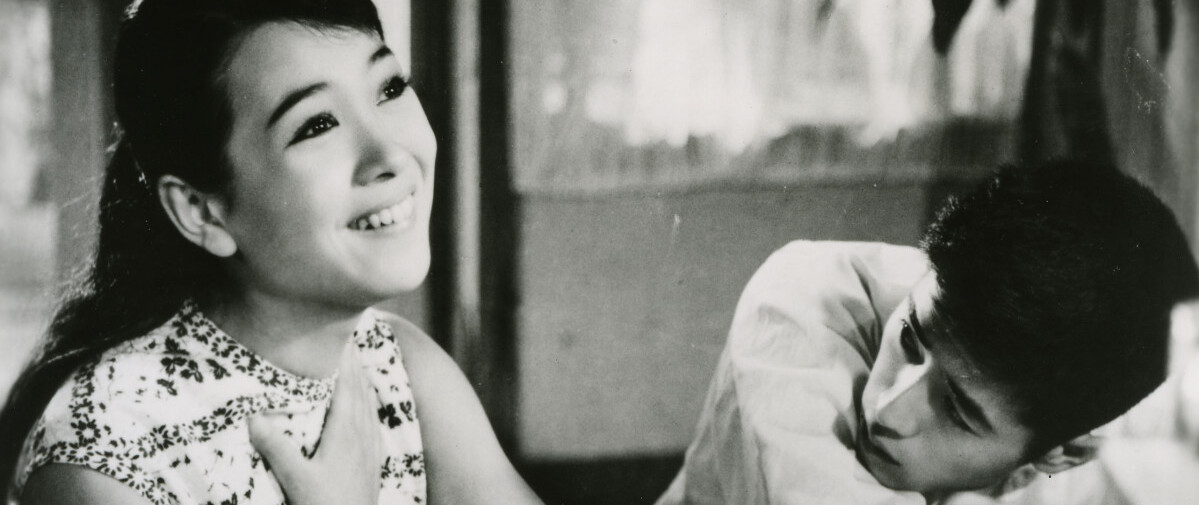
4–18 September
Though little known internationally, Yasuzo Masumura (1924–1986) is one of the key figures to emerge from 1950s and 1960s Japanese cinema, his 55 feature films provocatively reflecting huge changes in Japanese society, culture and cinema across this era. Developing a love of cinema during his upbringing in central Japan, Masumura briefly served in the army at the end of World War II, before studying law at the University of Tokyo where he became a close classmate of Yukio Mishima. After undertaking a second degree in philosophy, he started work at Daiei studio before winning a scholarship to attend the Centro Sperimentale di Cinematografia in Rome where he received instruction from, amongst others, Federico Fellini and Michelangelo Antonioni (who would become a champion of his subsequent work). On his return in 1953, Masumura worked as assistant director on Kenji Mizoguchi’s last films and three works by Kon Ichikawa. Masumura’s first film as director, 1957’s Kisses, set the pattern for his subsequent career as a forerunner of the “youth film”, as a conscious rejection of the work of his mentors, and in terms of its freewheeling audio-visual style. Commenting on its release, Nagisa Oshima stated that “I felt now that the tide of the new age could no longer be ignored by anyone, and that a powerful irresistible force had arrived in Japanese cinema”. This season brings together six key Masumura films made at Daiei between 1957 and 1969, highlighting his preoccupation with themes of individualism, eroticism, rebellion, the legacy of World War II, women’s rights and the darkening impact of the post-war economic “miracle”. It takes in several of Masumura’s most controversial and challenging films, such as Red Angel (1966) and Blind Beast (1969), as well as examples of his extensive and eclectic work in genre cinema: the corporate espionage tale, Black Test Car (1962), and the existential court drama, A Wife Confesses (1961).

7:00pm IREZUMI
Yasuzo Masumura (1966) 86 mins – Unclassified 15+
With Kaneto Shindo’s screenplay underlining the themes of social class and women’s oppressed position in Japanese society, Masumura’s tale of a woman (Ayako Wakao) transcending her literal branding (with a spider tattoo) to wreak vengeance on those who wronged her floats between ero guro, rape revenge, female melodrama and something stranger – a primal rage that touches on the existential. Visually sumptuous and desperately violent, it encapsulates the dissonance between the lurid and the majestic that Masumura specialised in creating. Based on the short story “The Tattooer” by Jun’ichiro Tanizaki.
4K DCP.
8:45pm BLIND BEAST
Yasuzo Masumura (1969) 86 mins – R 18+
Famously dubbed a “sick film” by Variety, Masumura’s gorgeous grotesquerie follows the spiral of degradation – or, perhaps, liberation – which ensues once the titular sculptor (Eiji Funakoshi) abducts an unwilling muse (Mako Midori) and imprisons her in his macabre, strikingly set-designed and deliriously symbolic warehouse studio. Variously called “outlandish”, “freakish”, “nutty” and “bizarre”, it leavens the horror with liberal doses of tongue-in-cheek silliness. Based on the novel by Edogawa Rampo, sometimes considered the “Japanese Edgar Allen Poe”.
4K DCP.

7:00pm RED ANGEL
Yasuzo Masumura (1966) 95 mins – Unclassified 15+
Based on the novel by Yoriyoshi Arima, Masumura’s most internationally celebrated film is also the peak of his 20 collaborations with actor Ayako Wakao. Set during the Second Sino-Japanese War, its narrative concerns an army nurse (Wakao) who, after being assaulted by a patient, begins performing sexual favours for others, questioning how to retain her humanity during the most inhumane events. A confronting and ethically complex film, “neither its nuanced eroticism nor its passionate, unpredictable moral focus can be easily shaken off” (Jonathan Rosenbaum).
4K DCP.
8:45pm A WIFE CONFESSES
Yasuzo Masumura (1961) 91 mins – Unclassified 15+
Exquisitely shot in intense black and white, this courtroom drama features Masumura regular Ayako Wakao as a woman accused of killing her husband — a professor with substantial life insurance — in a mountaineering accident. Referencing earlier classics such as Double Indemnity, its noir sensibility is crossed with an existentialism reminiscent of Resnais and Antonioni (a friend and influence on Masumura) to produce “one of Japanese cinema’s most striking portraits of a modern woman” (James Quandt). While often neglected in favour of the more extreme films Masumura completed later in the 1960s, various critics now consider it his masterpiece.
4K DCP.

7:00pm BLACK TEST CAR
Yasuzo Masumura (1962) 95 mins – Unclassified 15+
Masumura’s hard-edged thriller about rival car companies who resort to espionage, blackmail, dirty dealing and sabotage to gain market dominance, is a coruscating vision of the excesses and ruthlessness of Japanese corporate culture during the “economic miracle” of the 1950s and 1960s. Sleekly shot in black-and-white ’scope, this is amongst the director’s most purely pleasurable, engaging and fast-paced films, managing to imbue its speed-driven images of sportscar “tests” and competitive masculinity with a dark ethos. With Jiro Tamiya and Eiji Funakoshi.
8:50pm KISSES
Yasuzo Masumura (1957) 73 mins – Unclassified 15+
Masumura’s stripped-back, youth-centred debut is a startlingly direct, nuanced and melancholy exploration of Japan’s alienated post-war generation, with a young man and woman (Hiroshi Kawaguchi and Hitomi Nozoe) meeting cute while visiting their respective fathers at the same prison. An important precursor to the Japanese New Wave, the film’s free-roaming style, relative lightness and penetrating social critique led then-critic Nagisa Oshima to declare that a seismic shift had occurred in Japanese Cinema.